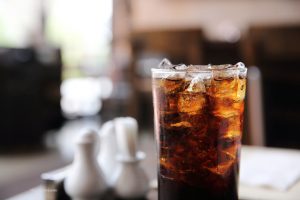The Center for Science in the Public Interest (CSPI) has just released a study showing that the levels of 4 methylimidizole (4-MI) in Coca-Cola varies, depending on where it is sold. That chemical is a carcinogen, although humans would have to consume thousands of cans of the product every day to reach the level of carcinogenicity seen in lab rats.
 The compound 4-MI forms when ammoniated caramel coloring used to give cola drinks their color is made. When California started requiring a cancer-warning notice on some colas earlier this year, Coke switched to a less-contaminated caramel coloring.
The compound 4-MI forms when ammoniated caramel coloring used to give cola drinks their color is made. When California started requiring a cancer-warning notice on some colas earlier this year, Coke switched to a less-contaminated caramel coloring.
CSPI measured the 4-MI content of Colas in nine countries. These are the amounts found in 12 fluid ounces, or 355 ml, of Coca-Cola.
- Brazil: 267 micrograms
- Kenya: 177 micrograms
- Canada: 160 micrograms
- United Arab Emirates: 155 micrograms
- Mexico: 147 micrograms
- United Kingdom: 145 micrograms
- Washington, D.C.: 144 micrograms
- Japan: 72 micrograms
- China: 56 micrograms
- California: 4 micrograms
The warning label required on products sold in California uses intake level of 30 micrograms per day. Scientists estimate that that amount of 4-MI would cause one cancer in 100,000 people over their lifetimes. The USDA restricts carcinogens in food to levels that cause one cancer in 1,000,000 people over their lifetimes. If the FDA applied its own standard to Coca-Cola, according to CSPI, one Coke would have to have under 3 micrograms of 4-MI.
The test results will be published in the International Journal of Occupational and Environmental Health.
Michael F. Jacobson, CSPI’s executive director, said, “fortunately, people in China, Japan, Kenya, and other countries drink much less soda than we Americans do, so their exposure to this dangerous chemical is proportionately lower. But now that we know it’s possible to almost totally eliminate this carcinogen from colas, there’s no excuse for Coca-Cola and other companies not to do so worldwide, and not just in California.”
CSPI added that “consumers should be more worried about the much greater risk posed by the sugar or high-fructose corn syrup in Coca-Cola and other sugary beverages. Over consumption of sugary drinks raises one’s risk of weight gain, obesity, diabetes, tooth decay, and other health problems.”




